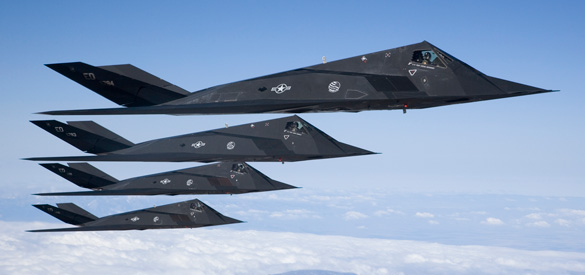Source: OpenMinds.TV -Alejandro Rojas, 7/26/13
According to a UCLA engineering alumnus, in 1993 a fellow alumnus, who happened to run one of the most advanced and secretive aircraft development organizations in the world, says the key to the technology that will allow us to travel to the stars, without taking a lifetime to get there, lies in ESP.
Ben Rich was the director of Lockheed’s Skunk Works from 1975 to 1991. Skunk Works is a division of Lockheed Martin that develops super high-tech aircraft, and is responsible for developing the U-2, the SR-71 Blackbird, the F-117 Nighthawk stealth bomber, and the F-22 Raptor.
In a recent interview with Open Minds, Jan Harzan, the new director of the Mutual UFO Network, told us about a presentation by Rich he attended in which he feels Rich shared some amazing insight. Like Rich, Harzan received an engineering degree from UCLA. In 1993, Harzan received an invitation from the alumni association to attend a talk by Rich at the alumni center.
Harzan attended the lecture with his friend Tom Keller, who is also an engineering alumnus of UCLA and shares Harzan’s interest in UFOs. Keller wrote a book on the topic titled, The Total Novice’s Guide to UFOs, which was published in 2010. Harzan estimates there were about 200 engineers in attendance.
Rich’s presentation consisted of a slide presentation outlining his 40 years with Skunk Works. The last aircraft he discussed was the F-117 which was developed in the early 80s, but was not revealed to the public until the late 80s. Rich alluded to more advanced technologies which have been developed since the F-117 but still remain secret.
Harzan says, “He intimated that there was a lot of other stuff going on that he could not talk about.” It was here that Harzan says things began to get really interesting. Harzan told us, “He ended his talk with a black disk zipping out into outer space, and he ended it with these words: ‘We now have the technology to take ET home.’”
Harzan says after this statement the crowd laughed, but he and Keller were shocked. He says, “Tom and I just looked at each other, ‘Did he really just say that, and are these people really not getting that what he is saying is real?’”
After the lecture, Harzan says 20 or so engineers gathered up around Rich to ask more questions. One lady asked about the technology to take ET home, but Rich sort of ignored the question. However, after being pressed by a couple of the other attendees, Rich asked one of the engineers if they thought it was possible to travel to the stars.
The engineer replied, “I don’t know, it would just take a long time to get there.” To which Rich responded that it would not. He told the group, “We found an error in the equations and we now know how to travel to the stars, and it won’t take us a lifetime to do it.”
Harzan says Rich did not say what equations he was referring to, but Harzan assumes they are what are known as Maxwell’s equations. However, he admits that this is just a guess.
Finally, Rich excused himself and began walking towards the door. Harzan called to Rich to ask him one last question. He told Rich, “I have a real interest in the propulsion you are talking about that gets us to the stars. Can you tell me how it works?”
Harzan says Rich stopped and looked at him, then asked Harzan if he knew how ESP worked. Jan says he was taken aback by the question and responded, “I don’t know, all points in space and time are connected?” Rich replied, “That’s how it works.” Then he turned around and walked away.
Harzan doesn’t know if he gave the answer Rich was looking for, or if Rich was simply referring to ESP as being the key to how the technology works, but he does believe there is something to Rich’s response.
Harzan says he feels he left the presentation with three very important clues, “One, we have the technology to take ET home. Two is there is an error in the equations… Finally, the way ESP works is the same way that this technology works. So there you have it. All that is left up to us is to go figure it out.”




